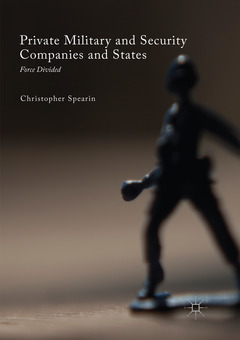Description
Private Military and Security Companies and States, Softcover reprint of the original 1st ed. 2017
Force Divided
New Security Challenges Series
Language: English
Subject for Private Military and Security Companies and States:
Private Military and Security Companies and States
Publication date: 08-2018
Support: Print on demand
Publication date: 08-2018
Support: Print on demand
Private Military and Security Companies and States
Publication date: 08-2017
Support: Print on demand
Publication date: 08-2017
Support: Print on demand
Description
/li>Contents
/li>Biography
/li>Comment
/li>
This book identifies and explains the functional and ideational boundaries regarding what states and Private Military and Security Companies (PMSCs) both do and possess regarding land power, sea power, and air power. Whereas the mercenaries, privateers, and chartered companies of years past held similar characteristics to state military forces, the PMSCs of today are dissimilar for two reasons: a conventional forces norm amongst states and a state proclivity towards the offensive. These factors reveal both the limitations of and the possibilities for contemporary security privatization. This volume is ideal for civilian and military practitioners and students wishing to develop a detailed understanding of what the private military and security industry has to offer and why it is structured the way it is.
Chapter 1: Introduction.- Chapter 2: Conventional Forces Norm.- Chapter 3: The Histroy of commercial non-state violent actors.- Chapter 4: Land Power and PMSCs.- Chapter 5: Sea Power and PMSCs.- Chapter 6: Air Power and PMSCs.- Chapter 7: Conclusion.
Christopher Spearin is Associate Professor of Defence Studies at the Royal Military College of Canada/Canadian Forces College.
Offers the first comprehensive treatment of PMSC presence in the land, sea, and air settings Provides an interdisciplinary approach employing international relations theory, sociology, security studies, and state military concepts and history Argues that PMSCs are framed to offer services that are reliant on human labour rather than on sophisticated technologies
© 2024 LAVOISIER S.A.S.




